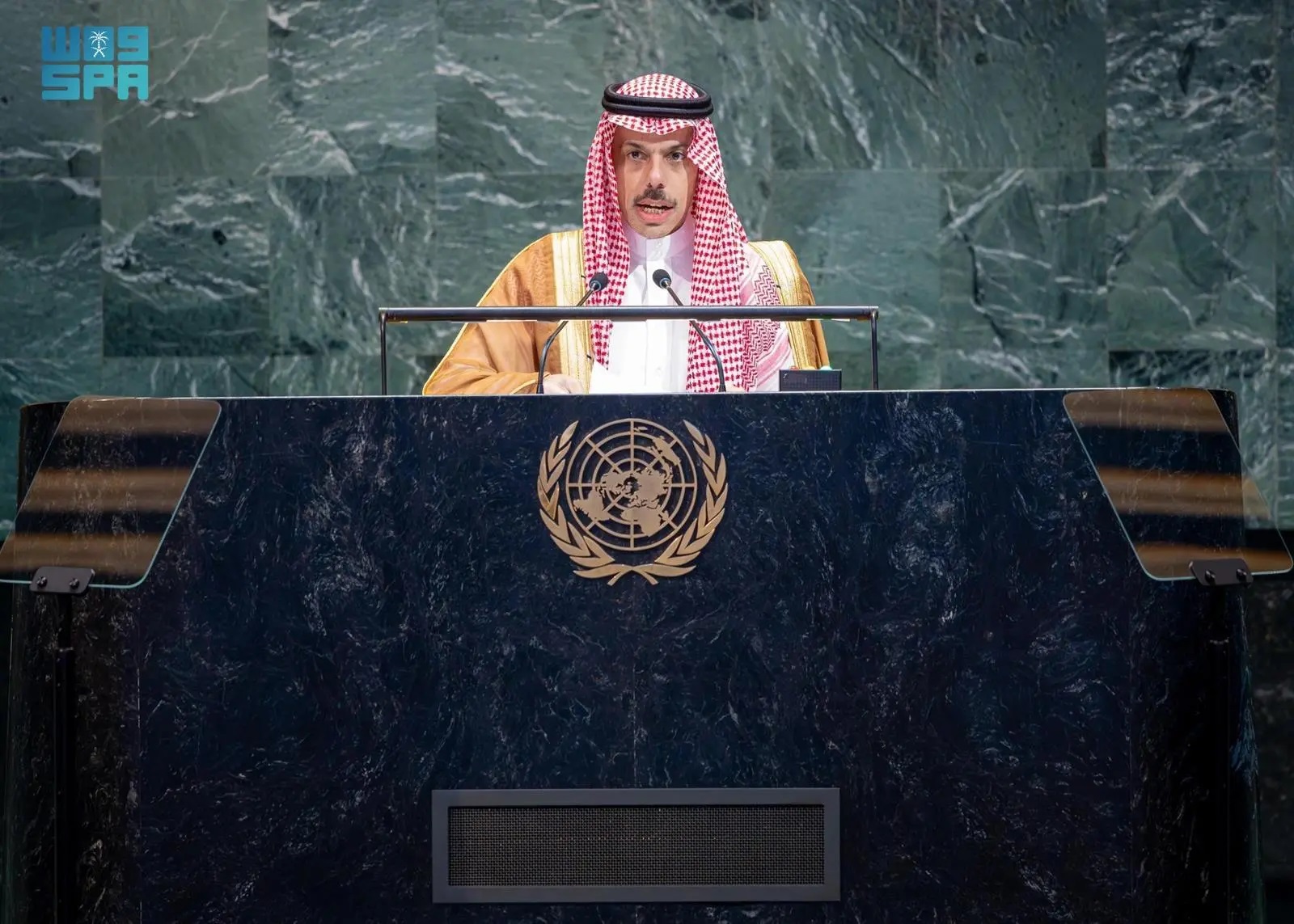
Foreign Minister Delivers Saudi Arabia's Speech at 80th UN General Assembly
Minister of Foreign Affairs Prince Faisal bin Farhan bin Abdullah delivered the Kingdom of Saudi Arabia's speech at the 80th Session of the United Nations General Assembly.
At the beginning of his speech, the foreign minister said Saudi Arabia is proud to be a founding member of the United Nations and spares no effort to translate the principles of the United Nations Charter into a tangible reality by consolidating respect for international law and strengthening international peace and security, based on its profound belief in the importance of the UN's role. Prince Faisal emphasized Saudi Arabia's commitment to achieving the charter's objectives by contributing to responding to humanitarian appeals and extending a helping hand. Prince Faisal noted that Saudi Arabia's aid has exceeded $141 billion, benefiting 74 countries.
The foreign minister reaffirmed Saudi Arabia's firm position on the Palestinian cause, stating that the time has come to find a just and lasting solution to the issue. He emphasized that dealing with it outside the framework of international law and legitimacy led to the continuation of violence and the exacerbation of suffering.
The minister said, "The international community's failure to take decisive action to halt Israeli attacks and violations will only contribute to destabilizing regional and global security and stability, opening the way for dangerous repercussions and the escalation of war crimes and acts of genocide."
Regarding the Kingdom's ongoing efforts to resolve the Palestinian cause, Prince Faisal stated that Saudi Arabia, in cooperation with the Kingdom of Norway and the European Union, initiated the launch of the International Coalition to Implement the Two-State Solution, and co-chaired with the French Republic the High-Level International Conference on the Peaceful Settlement of the Question of Palestine and the Implementation of the Two-State Solution. This constitutes a clear path to ending the occupation and conflict. The foreign minister praised the countries that have recognized the Palestinian state, as well as the Palestinian National Authority's commitment to implementing essential reforms that deserve further support and empowerment from the international community.
Prince Faisal also emphasized the importance of adhering to the non-proliferation and nuclear arms control regimes in the region, the need to protect the security, navigation, and freedom of the Red Sea, the Gulf of Aden, and the Straits, and to combat terrorism and dry up its sources. He also warned of the dangers of the military use of AI applications and autonomous weapons, and the need to enact international laws to regulate them.
Prince Faisal praised the positive steps taken by the Syrian Arab Republic to consolidate security and stability. He also reiterated Saudi Arabia's commitment to restoring security and stability in the Republic of Yemen, as well as its continued efforts to support the Yemeni economy and alleviate humanitarian suffering, given Saudi Arabia's status as the largest donor to the Republic of Yemen.
He also affirmed Saudi Arabia's commitment to the stability of Sudan and the unity and integrity of its territories, emphasizing the importance of continuing dialogue through the Jeddah platform. He emphasized Saudi Arabia's rejection of any steps outside the framework of state institutions that may undermine Sudan's unity and do not express the will of its brotherly people. He also affirmed Saudi Arabia's support for a Libyan-Libyan solution in Libya that consolidates its unity and supports counterterrorism efforts. The minister expressed Saudi Arabia's support for Lebanon and its appreciation for the Lebanese state's efforts to implement the Taif Agreement, extend state sovereignty, and restrict the possession of weapons to the Lebanese state and its legitimate institutions.
At the conclusion, Prince Faisal highlighted Saudi Arabia's long-term development path under its Vision 2030, and the goals achieved during the past period, including empowering youth and women, promoting values of tolerance, expanding horizons of international communication and cooperation, reducing unemployment, and increasing women's participation in the labor market. He also highlighted Saudi Arabia's pioneering initiatives to mitigate the effects of climate change and combat desertification and drought, such as the Saudi and Middle East Green Initiatives, along with Saudi Arabia's announcement of the establishment of the Global Water Organization to be headquartered in Riyadh, affirming Saudi Arabia's commitment to sustainable development and achieving a balance between growth and climate, thus contributing to the protection of the global climate system.








